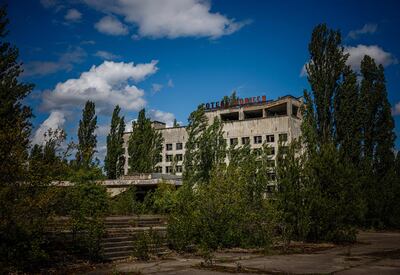The world is fortunate that there has been no nuclear disaster in Ukraine after a year of fighting with Russia, the UN's atomic watchdog has said.
The International Atomic Energy Agency said the situation at the Russian-occupied Zaporizhzhia nuclear plant "continues to be fragile and potentially dangerous".
In a report marking the war's anniversary, it said the safety of three other plants still held by Ukraine should not be overlooked amid Russian strikes on the power grid.
The site of the 1986 Chernobyl disaster has also suffered damage but radiation levels are normal, the report said.
The IAEA's director general Rafael Grossi said the agency was doing "everything possible" to avert a nuclear accident that "could cause even more suffering where there is already far too much".
"One year has passed since the beginning of the war in Ukraine, marking the first time in history that a war is being fought amid the facilities of a major nuclear power programme," Mr Grossi said.
"We are fortunate that a nuclear accident has not yet come to pass, and we must do everything in our power to minimise the chance that it does."

China on Friday called for the two sides to "resolutely avoid man-made nuclear accidents" in what it called a 12-point peace plan.
The Zaporizhzhia plant, the biggest in Ukraine, has raised particular concern after Russia and Ukraine blamed each other for shelling near the site.
Russia occupies the plant and claimed to have annexed the Zaporizhzhia region last autumn.
The IAEA has been lobbying in Kyiv and Moscow to create a safety zone around the plant, after reactor buildings and waste sites were damaged by the shelling.
An external power supply has been cut off five times, the chain of command is uncertain and the site's integrity is "severely compromised", the report said.
It said there were worrying levels of fatigue among Ukrainian staff that could lead to a catastrophic human error.
However, radiation levels have remained normal and Zaporizhzhia's six reactors have not been directly damaged.
While both sides say they support a safety zone in principle, the IAEA has yet to broker a deal on how wide it should be.

At Chernobyl, which was occupied by Russia in the first weeks of the war, safety equipment was stolen and the exclusion zone laid with mines, the IAEA said.
It said the site was "gradually recovering from the Russian military actions", with staff working two-week shifts in improvised conditions.
Radiation levels at Chernobyl remain low and within the range measured before the Russian invasion, it said.
Three other plants - Khmelnytskyy, Rivne and South Ukraine - have not left Ukrainian hands but are vulnerable to a loss of power caused by Russia's bombardment of the energy grid.
All of Ukraine's plants lost external power due to Russian strikes in November, which Mr Grossi said "shows the precariousness of the nuclear safety situation in Ukraine".
The IAEA last month set up a permanent presence at all Ukrainian plants and said it plans to deliver 240,000 potassium iodide pills to guard against radiation poisoning.
It said it had debunked a Russian claim that Ukraine was preparing radioactive "dirty bombs".
Russian President Vladimir Putin has alarmed many by hinting he could use nuclear weapons in the conflict.


